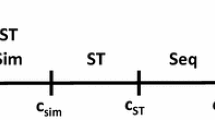Abstract
The fact that incumbents generate and spend more campaign funds than challengers raises the question of why incumbents set campaign spending limits. The Canadian federal elections between 1979 and 2000 are used to evaluate three theoretically plausible explanations: to limit costly effort; to reduce the probability that well-funded candidates buy-off elections; to maximize the incumbent’s vote-share. It is estimated that the marginal benefit of low levels of campaign spending are greater for majority candidates than challengers, but that diminishing returns set in more quickly, indicating that a well-chosen limit could maximize the majority candidate’s vote-share. The actual and estimated optimal majority vote maximizing campaign spending limits compare favorably.
Similar content being viewed by others
References
Abramowitz, A. I. (1988). Explaining senate election outcomes. The American Political Science Review, 82(2), 385–403.
Ansolabehere, S., de Figueiredo, J. M., & Snyder Jr., J. M. (2003). Why is there so little money in U.S. politics?. Journal of Economic Perspectives, 17, 105–130.
Bender, B. (1988). An analysis of congressional voting on legislation limiting congressional campaign expenditures. Journal of Political Economy, 96, 1005–1021.
Canada. Elections Canada (n.d.) (1979). Thirty-First General Election. Report of the Chief Electoral Officer: Pursuant to subsections 58(9) of the Canada Elections Act. Chief Electoral Officer of Canada.
Canada. Elections Canada (n.d.) (1984). Thirty-Third General Election. Report of the Chief Electoral Officer: Pursuant to subsections 58(9) of the Canada Elections Act. Chief Electoral Officer of Canada.
Canada. Elections Canada (n.d.) (1988). Thirty-Fourth General Election. Report of the Chief Electoral Officer: Pursuant to subsections 58(9) of the Canada Elections Act. Chief Electoral Officer of Canada.
Canada. Elections Canada (n.d.) (1993). Thirty-Fifth General Election. Official Voting Results. Chief Electoral Officer of Canada.
Canada. Elections Canada (n.d.) (1997). Thirty-Sixth General Election. Official Voting Results. Chief Electoral Officer of Canada.
Canada. Elections Canada (n.d.) (2000). Thirty-Seventh General Election. Official Voting Results. Chief Electoral Officer of Canada.
Crain, W. M., Tollison, R. D., & Leavens, D. R. (1988). Laissez-faire in campaign finance. Public Choice, 56, 201–212.
Evans, T. A. (2006). The effects of discretionary federal spending on parliamentary election results. Economic Inquiry, 44(2), 234–248.
Glantz, S. A., Abramowitz, A. I., & Burkart, M. P. (1976). Election outcomes: whose money matters? Journal of Politics, 38, 1033–1038.
Green, D. P., & Krasno, J. S. (1988). Salvation for the spendthrift incumbent: re-estimating the effects of campaign spending in house elections. American Journal of Political Science, 32(4), 884–907.
Grier, K. B. (1989). Campaign spending and senate elections, 1978–84. Public Choice, 63, 201–219.
Jacobson, G. C. (1978). The effect of campaign spending in congressional elections. American Political Science Review, 72, 469–491.
Jacobson, G. C. (1980). Money in Congressional elections. New Haven: Yale University Press.
Jacobson, G. C. (1990). The effects of campaign spending in house elections: new evidence for old arguments. American Journal of Political Science, 34, 334–362.
Lazear, E. P., & Rosen, S. (1981). Rank-order tournaments as optimum labor contracts. Journal of Political Economy, 89, 841–864.
Levitt, S. D. (1994). Using repeat challengers to estimate the effect of campaign spending on election outcomes in the U.S. House. Journal of Political Economy, 102, 777–798.
Levitt, S. D. (1995). Policy watch: Congressional campaign finance reform. Journal of Economic Perspectives, 9, 183–193.
Levitt, S. D., & Snyder Jr., J. M. (1997). The impact of federal spending on House election outcomes. Journal of Political Economy, 105, 30–53.
Nagler, J., & Leighley, J. (1994). Presidential campaign expenditures: evidence on allocations and effects. Public Choice, 79, 213–245.
O’Keeffe, M., Viscusi, W. K., & Zeckhauser, R. (1984). Economic contests: comparative reward schemes. Journal of Labor Economics, 2, 27–56.
Palda, K. S. (1975). The effect of expenditures on political success. Journal of Law and Economics, 18, 745–771.
Palda, F., & Palda, K. (1985). Ceilings on campaign spending: hypothesis and partial test with Canadian data. Public Choice, 45(3), 313–331.
Palda, F. & Palda, K. (1998). The impact of campaign expenditures on political competition in French legislative elections. Public Choice, 94, 157–174.
Rosen, S. (1986). Prizes and incentives in elimination tournaments. American Economic Review, 76, 701–715.
Stratmann, T. (2006). Contribution limits and the effectiveness of campaign spending. Public Choice, 129, 461–474.
Thirty-First General Election (1979). Report of the Chief Electoral Officer respecting election expenses.
Thirty-Third General Election (1984). Report of the Chief Electoral Officer respecting election expenses.
Thirty-Fourth General Election (1988). Report of the Chief Electoral Officer respecting election expenses.
Thirty-Fifth General Election (1993). Contributions and expenses of registered political parties and candidates.
Thirty-Sixth General Election (1997). Contributions and expenses of registered political parties and candidates.
Thirty-Seventh General Election (2000). Contributions and expenses of registered political parties and candidates.
Welch, W. P. (1981). Money and votes: a simultaneous equation model. Public Choice, 36(2), 209–234.
Author information
Authors and Affiliations
Corresponding author
Rights and permissions
About this article
Cite this article
Evans, T.A. An empirical test of why incumbents adopt campaign spending limits. Public Choice 132, 437–456 (2007). https://doi.org/10.1007/s11127-007-9170-0
Received:
Accepted:
Published:
Issue Date:
DOI: https://doi.org/10.1007/s11127-007-9170-0




